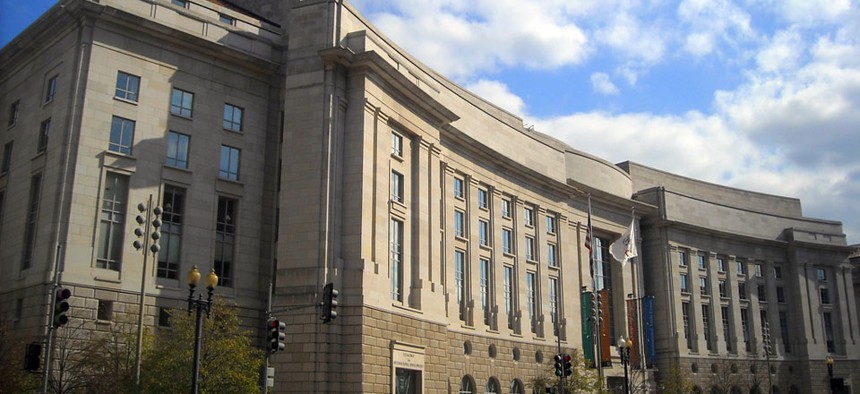
The Ronald Reagan Building in Washington, DC Flickr user NCinDC
Federal Buildings Still Open for After-Hours Events During Shutdown
GSA keeps most facilities minimally staffed even when the government is officially closed.
Thursday night’s Service to America Medals celebration in Washington was planned, of course, long before the government shutdown.
But the banquet planners at the nonprofit Partnership for Public Service knew they could proceed confidently with the gathering at the Federal Triangle’s elegant Mellon Auditorium despite the irony of thousands of federal workers being under furlough. (Indeed, next door at the Environmental Protection Agency, only 5 percent of employees were allowed on the job.)
The reason? The government’s landlord, the General Services Administration, is tasked with using contractors and federal employees deemed essential for maintaining building security and custodial services to protect federal property. That includes, with a few exceptions, honoring the rights of outside groups to stage special events in public buildings.
One loser in the arrangement is the Smithsonian Associates program, which has lost its venues for its lectures, classes and concerts because the entire complex of the Smithsonian Institution is shut down. “As you might be aware, The Smithsonian Associates does not receive any federal funding,” the associates’ executives said in an email to its thousands of members. “We are looking for alternative venues for upcoming programs, and are making every effort to hold events as scheduled.”
Shutdown guidance for GSA notes that “in the absence of appropriations, GSA-owned and leased buildings will remain open. In many cases, because of the impact on the number of personnel managing these buildings, the services will be limited and will be similar to weekend operations. Maintenance and janitorial services, telephone service, lighting, and power will continue so that tenant agencies can continue to provide vital services and perform essential missions.”
In addition, “parking spaces associated with these facilities will remain open as usual,” the guidance reads. “The Federal Protective Service will continue to provide building security. GSA will have limited personnel that will be available to assist federal agencies in GSA owned and leased buildings to provide support for life safety, property protection, contracting, communications and IT services.”
The Mellon Auditorium, while owned by GSA, is privately managed by a corporation under contract, according to Jenna Mack, owner of Event Emissary, which won the contract a decade ago. Event Emissary books and staffs the hall -- available 365 days a year for a stated base price of $12,000 -- while building security and janitorial services are provided by separate contractors. “No U.S. funds are required,” Mack said.
There are other special arrangements for particular buildings. The nearby Ronald Reagan Building and International Trade Center, though GSA-owned, is required by statute to be open for conferences and catered events, noted Bob Peck, the former commissioner of GSA’s Public Buildings Service now director of workplace consulting for the southeast region at the global design firm Gensler. The government shutdown, Peck said, will not cost GSA much in missed revenues from outside parties for a variety of reasons, not the least of which is that most facilities must remain open.
“A lot of federal buildings, many not in Washington, are multi-agency,” he said. “While one agency may have most people on furlough, another, say one in law enforcement, will have most staff at work. Also, it’s hard to shut down the heating or air conditioning for part of a building -- you have to operate it as a whole.” Even if the entire staff is out, Peck added, “you need someone watching because a pipe could burst, to make sure the government doesn’t lose money on an asset.”
Any revenue the GSA might bring in from renting building space piecemeal is small -- probably less than $100 million in a $9.5 billion annual take of the buildings fund, Peck said. The agency allows many groups such as Rotary Clubs or Boy Scout troops free use of space, though there are sites where commercial shopkeepers pay rent.
The Old Executive Office Building on Washington’s Pennsylvania Avenue Northwest, for example, was for years host to multiple food-court vendors and shops, but it never brought in more than $1 million a year, he said. (The historically designated building has since been leased to Donald Trump’s company for conversion to a luxury hotel.)
Peck, who was forced out of GSA in April 2012 in the wake of the scandal over lavish spending at a Las Vegas training conference, expressed sympathy for today’s furloughed workforce. For outside groups, the shutdown “is more of an inconvenience” in that the property managers may ask them to help pay for security and cleanup to supplement the government’s skeletal staff, he said.
But for full-time federal workers, “The public doesn’t know how awful the federal employees feel about this.” Peck, who started at GSA in 1995 during the previous government shutdown, recalls the disappointment among employees when he had to tell them they were not permitted to work. Given that many in the public assume that furloughed workers take delight in the down time, he said, “This situation puts the government employee in a whole different light.”
NEXT STORY: Contractors Start to Feel the Shutdown Pain







